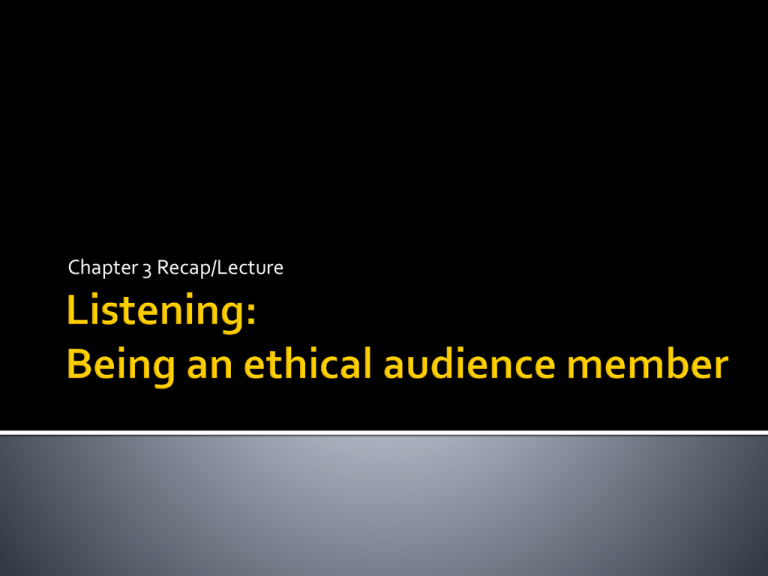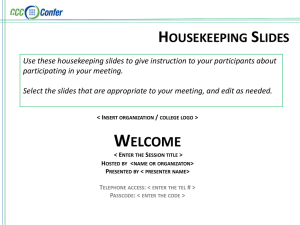Listening: Being an ethical audience member
advertisement

Chapter 3 Recap/Lecture What is the difference? Listening + Critical Thinking Textbook gives 4 as examples: Appreciative Listening Empathic Listening Comprehensive Listening Critical Listening Focus of Chapter; Most connected with Public Speaking CAUSES OF POOR LISTENING Not concentrating Listening too hard Jumping to conclusions Focusing on delivery and personal appearance WAYS TO IMPROVE LISTENING Take it serious Use active listening Resist distractions Including appearance or delivery Hold off on judgment Focus Main points, evidence, technique Take notes Ex: keyword note- taking/outline Complete the Listening Self-Evaluation Worksheet on page 54: -Since listening skills can differ based on the type of listening, let’s compare appreciative listening to comprehensive/critical listening -Fill out one worksheet, imagining that you are answering the questions about listening to your favorite comedian doing their stand-up routine -Fill out the second worksheet, imagining you are answering the questions about listening to a class lecture (on a topic that isn’t necessarily your favorite) -Where do you need to improve? How will you work on it? Share responses with a classmate. Chapter 4 Lecture/Recap Tuesday, January 1/29 2-4 Minutes Visual Aid - Object Introduction Speech Interesting facts? Event? Most important things? General overview? Worth 50 points Speech materials: Topic/Audience handout (will discuss next week) and notecards Start thinking of topic ideas; bring list on Tuesday Not expecting perfection! Speech sign ups: Thursday, January 24th Most print critique sheets from faculty webpage Topic (select, focus, develop) Organization Introduction (tell them what you’re gonna tell them) ▪ How are you going to get our attention? ▪ How are you going to tell us why you are here? Body (tell them) ▪ How are you going to organize the information in a way to help us understand? ▪ How will you keep our interest? ▪ What are your main points? ▪ How will you help us know that you are moving to the next point? (transitions) Conclusion (tell them what you told them) ▪ How will you provide us with a memorable close? ▪ How will you remind us of your central idea? Focus more on these elements in week 6 For first speech, will look more for general layout, topic selection, and creativity In future speeches, will look harder at organization; remember skills should improve with each speech Extemporaneous Delivery Not code for “wing it” Do not write entire speech out Use keywords on note cards (make sure info is visible) Rehearse Practice out loud Practice in front of mirror and/or others Ask for feedback Watch samples of speeches Time your speech On Presentation Day Be calm Avoid distracting behaviors Voice: speak loudly, slowly, and clearly Watch out for space fillers: “like, uhhh, ummm” Focus more on these elements in week 8 Again--For first speech, will look more for general layout, topic selection, and creativity Will look to see if you paid attention to what has already been said about delivery (e.g. eye contact) Will note areas for improvement to focus on In future speeches, will look harder at delivery; remember skills should improve with each speech What did they do well? What did they need to work on? Example 1: http://www.youtube.com/watch?v=V-18KJ_HPe8 Example 2: http://www.youtube.com/watch?v=Hc3CzrBuF8g Activity for Thursday Speeches in pairs Topic: “The reasons we chose Gordon College” or “The reasons why Gordon College is a good school” or “The reasons we enjoy living in Georgia” (Other topics: negotiable) Will have class time to prepare, present, and have peer critique sessions During critique sessions—will address “key areas” to work on; will set goals for first speech






